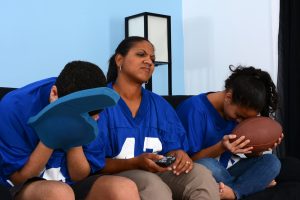Fandom to individuals or sports teams is a big part of American society. One forms close ties to public figures or actors or for one’s sports team. Whether football, baseball, basketball or hockey, or professional or college levels, individuals form tight bonds with their teams. They became entranced by the teams record, status, players, and play close attention to every move and play. In addition, individuals invest heavily financially in tickets, or sports clothes, pennants, or mugs. Family gatherings around sporting events become very important and the value of a particular team becomes identical to family tradition, history and local area. The team represents the person and his or her background. In many ways, it can become very personal.
Due to this type of bond that involves investment of self, the team is not merely an outside agent but part of the individual. While the person may not play the game, suffer the loss, or earn the win, the individual does mentally and emotionally share every play and outcome. This can lead to the pain of loss and grief when the team loses or suffers. It is a pain that is real because it involves the person’s life itself as well. The day or week may be greatly affected by a loss.

The degree of the loss and adjustment however determines the healthy response versus the pathological response. A healthy individual who finds great joy in sports has a greater connection than someone who sees it only as minor entertainment. The bond to the team hence will create a natural response of grief due to loss. If a team loses or is re-located, a true pain can set in that is personal. However, how one adjusts and is able to respond to life itself after the loss determines if the response is normal or pathological. If one feels low or bummed out, it is quite natural to feel this way for a couple days, but if one enters into a depressed state for weeks and is unable to interact or find interest in life, then the connection and the loss itself is pathological.
Fans can be fanatical. It is OK to have fun and it is definitely normal for the passionate fan to feel grief and sadness over loss. However, when that loss becomes so empowering that it prevents the person from enjoying life outside of sports, or prevents them from existing in the world, then one should seek counseling help and re-evaluate the bonds one has with the particular team.
Too many times, one sees violence at sporting events. This type of deep passion is associated with unhealthy bonds with the team. It involves associating the team with oneself so deeply, that anyone else becomes the enemy. Loss hence becomes extremely painful for these individuals and can negatively affect their life.
Sports is fun. It is good and for those who have deeper bonds to a team due to family history, community or identity, then one should find great pride in that, but one should not allow it to become disproportionate and cause massive depression or violent moods. One will suffer the grief of loss more than a regular outsider, if one is bonded with a team, and that is OK. The joy of having such a connection enhances the entertainment and value, but one needs to prevent such attachments from becoming pathological.
Please also review AIHCP’s Grief Counseling Training Program and see if it meets your academic and professional goals. The program is online and independent study and open to qualified professionals seeking a four year certification in Grief Counseling.
